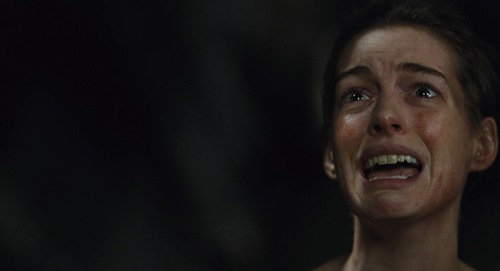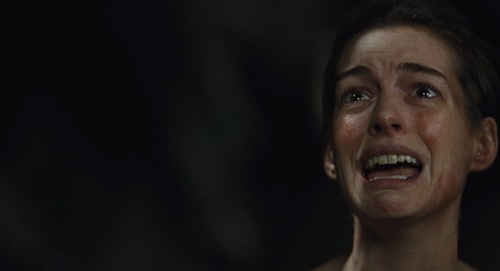This repost by Katherine Murray appears as part of our theme week on Movie Soundtracks.
Ugly singing; ugly make-up. Les Misérables is deservedly known as the film that tried too hard to bum us out, and Anne Hathaway is known as the actress who tries too hard to be liked. But isn’t it nice, sometimes, when somebody makes an effort?

Tom Hooper’s 2012 film adaptation of Les Misérables is either an exercise in profoundly committed, sincere expressions of raw emotion, or a hammy, emotionally manipulative attempt to win Oscars. In fact, it’s probably both of those things at different times, but it stands out due to Hooper’s unusual choice to record the actors singing live.
Pitchy, breathy, raspy, screamy – all the notes are there as A-list Hollywood actors hurl themselves at the camera, relishing the chance to look and sound as ugly as their quasi-operatic characters feel. The soundtrack is probably not going to go on your iPod.
That said, there’s something amazing about the pitchiness / raspiness / screaminess / ugliness that serves to draw us in. When the cast list was announced, it seemed strange, because many of the actors were not really known as great singers, but the movie isn’t about singing an ear-pleasing song. It’s about letting the actors emote in the moment, having their voices sync up with the other acting choices they make in the scene – the result is something that seems so authentic and raw that it starts to go the other way and seem manipulative again.
The standout number in the film, and the one you would cite, were you trying to convince someone it’s awesome, is, of course, Anne Hathaway sobbing her way through “I Dreamed a Dream.” She won an armful of awards for it, including an Oscar, and deservedly so. There’s something beautiful and unselfconscious about the way she just lets herself go in that scene – a kind of emotional nakedness, where we believe the despair that she’s feeling. We can see that she’s let herself disappear inside the character, and invited us to see her in this dark, vulnerable moment, without any fear that she’s going to look stupid. That’s rare, and it displays a type of courage and skill as a performer that should be rewarded.
It’s also reminiscent of Jennifer Hudson’s standout performance of “And I am Telling You I’m Not Going” in Dreamgirls. That performance similarly made the whole movie, and led to an Oscar win for the woman screaming her pain to the camera.

Hudson doesn’t go to the ugly place in Dreamgirls. The studio-recorded track sounds beautiful, and the makeup department isn’t trying to make her look diseased. What makes the scene stand out, though, is still the amount of raw emotion she pours into it. A more gifted vocalist than Hathaway, she uses her voice to convey a torrent of rage, despair, and desperation, which she then telegraphs through her body language and facial expressions on screen.
We’re drawn into her performance, and it conveys the most important emotional truth of the scene – that, even though her character’s words sound powerful, they’re being shouted from a place of total loss. She says, “I am telling you,” but there’s no one to tell. She’s lost her partner and her friends — she stands alone on a darkened stage without even the audience she hungered for. And, into the darkness, she orders, “You’re gonna love me, yes you are!”
It’s a powerful moment, and Hathaway’s performance in Les Misérables is like that, with the additional layer that Les Mis is so proud of her suffering.
Whereas Dreamgirls is a pretty standard and standardly-shot movie musical – enlivened by outstanding vocals from Hudson and co-star Beyoncé — Les Misérables is really reaching for the brass ring. It has a take-no-prisoner’s approach to engaging with the story’s pathos, and an awkward kind of delight in making everyone seem plague-ridden and miserable.

Don’t get me wrong – I love Les Misérables. I had low expectations, but I was less than ten minutes in before I felt that special shiver of delight that tells you you’re watching a kick-ass movie. I would much rather watch a film where everyone really goes for it, even if their reach sometimes exceeds their grasp.
At the same time, I completely understand why some people found it annoying.
The annoyance comes in part because you’re watching people who do not live in poverty pat themselves on the back for how poor they’re willing to make themselves look, and how deeply they’re willing to crawl inside the suffering of others. The ugly singing and the ugly makeup can be read as self-congratulatory – “Look how much I’m willing to debase myself for art! I don’t care if I look pretty; I just care if I’m authentic.” After a certain point, it comes across as trying too hard – of actually being inauthentic, since the attempt at authenticity feels so calculated.
It’s the same criticism that’s followed Anne Hathaway, herself. Whereas Jennifer Hudson came across to us as a spirited American Idol reject, who made good on her big dreams of stardom by signing her heart out in Dreamgirls, Anne Hathaway has been criticized for coming across as fake during public appearances. In fact, the backlash against Hathaway reached a fever pitch just as she was accepting her slew of awards for Les Mis.
No doubt, there’s a sharp contrast between the vulnerability she shows in “I Dreamed a Dream,” and the polished, eager-to-please persona she throws on in public. (Though I hasten to add that a lot of celebrities seem self-conscious in managing their public personas; for people who want to be liked, there’s nothing better or worse than having millions of people stare at you).
The general reaction to Les Misérables seems to fall along similar lines. The raw, ugly, emotionally intense performance is either touching because it seems authentic, or it’s disgusting because it seems crass and manipulative. We all agree that the emotions, like the vocals, weren’t cooked and seasoned before they were served, but we don’t agree about whether that’s fresh and exciting, or lazy and self-involved.
Like Anne Hathaway, the movie is trying hard. Like Jennifer Hudson, it’s screaming, “You’re gonna love me,” into the darkness. One cannot dare to be loved without risking rejection, and Les Misérables invites both love and rejection from its audience – but, isn’t it beautiful to see – and to hear – someone try?
Katherine Murray is a Toronto-based writer who yells about movies and TV on her blog.

